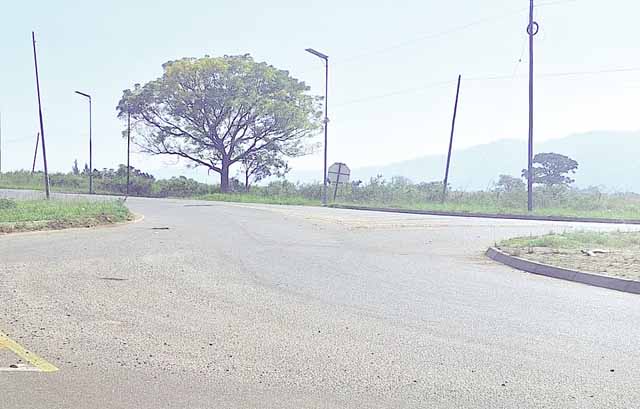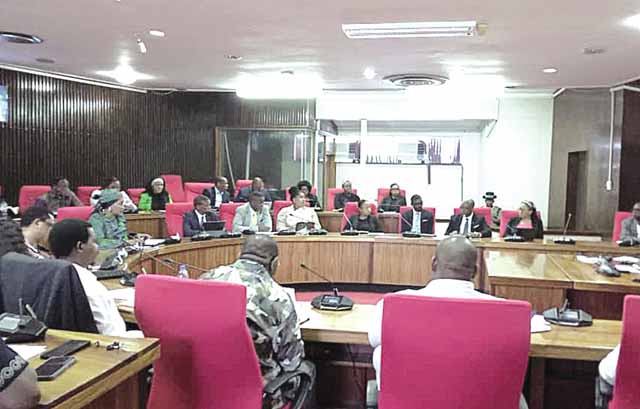By Ackel Zwane | 2018-02-23

WHO is the ultimate beneficiary from legislators’ admission of guilt that they have failed the nation in their watchdog role to stem the rising tide of corruption in Swaziland?
Even more intriguing are suggestions that they would kowtow to His Majesty King Mswati III to make this admission on behalf of the people of Swaziland and what they expect the King to do is a matter for another day.
Deliberations coming out of Senate this week to the effect that cases of corruption are not being processed by our justice system is even more disturbing, raising questions about whether Swaziland possesses a true understanding as to what extent corruption has eroded the economy or society at large. It is not rocket science statistics that a corruption index is used as opposed to an anticorruption index but yes it is about how rampant corruption is in Swaziland and what is being done about it. It would appear nothing at all is being done save to admit that it is a free for all as the justice systems has gone to roost.
declined
According to latest statistics the "Corruption Perceptions Index" for the public sector showed 57 points in Swaziland for 2014. The scale has a range from 0 to 100, in which corruption raises, the higher the number is. With this result Swaziland ranks 77th. So, compared to other countries it is slightly below average, so interprets Transparency International.
Compared to the previous year, in 2014 the level of corruption decreased a bit. In the long term, it has also declined moderately in recent years. The ranking is led by Denmark with a value of eight. The sad last place is occupied by Somalia (92 points).
In 1995 the German professor Johann Graf Lambsdorff developed the "Corruption Perceptions Index" at the University of Passau. Corruption can be measured only in the fewest cases. If something is measured, then it is known. This would contradict the principle that corruption per se is illegal or at least unethical, and therefore under a certain level of secrecy.
For this reason the corruption index is based on investigations and surveys of nine independent institutions. Both business people and analysts were asked about 176 countries worldwide for their assessment of corruption in the public sector. The index is published annually by Transparency International.
It would seem, in the isolated case of Swaziland, these are mere estimates but the actual damage on the ground is unknown because unless corruption is fought it never ceases to deteriorate a country rendering it a gutter state, by its very nature. It is noteworthy the extent to which South Africans have woken up to the most devastating effects of corruption such as state and media capture. We have seen it in this country with parastatals bankrolling unconventional media either to suppress good trade unionism or to protect inefficiencies of officials wielding authority in the state investment corporates. It is no surprise that such expressions as ‘Swazis being related to one another one way or the other’ find their way into Parliament making the rule of law a wild shot in the dark.
Global Security notes that corruption in Swaziland is widespread, and although investigations are frequently reported, little is heard thereafter; citing the minister of finance as having said a private consultant's report estimates six million USD (E40 million) of potential government revenue is lost each month due to corruption. This is lost tax revenues due to goods smuggled into and through Swaziland.
Schools principals and teachers routinely demanded bribes to admit learners, immigration and customs officials did so to issue government documents.
Global Security further reports that a person’s relationship with government officials influenced the awarding of government road construction and other contracts; the appointment, employment, and promotion of officials; recruitment into the security services; and school admissions. Authorities rarely took action on reported incidents of nepotism.
contractual
Swaziland passed the Prevention of Corruption Act in 2007 which established the Anti-Corruption Commission. The Swaziland Public Procurement Act became law in 2010. The Swaziland Public Procurement Agency (SPPRA) was established in 2012. The SPPRA will oversee public purchasing and set up a code of conduct for public sector procurement officers to track all public funds not only for procurement but any other contractual agreement for goods, works or services.
Civil society organisations accuse Swaziland's Anti-Corruption Commission of engaging in politically motivated investigations and failing to tackle genuine issues of corruption. The Act disqualifies public sector workers and politicians from supplying the government.
SPPRA conducted capacity building exercises nationwide to increase knowledge and adoption of universally practiced purchasing systems with private companies. According to section 27 of the Public Procurement Regulations, suppliers are prohibited from offering gifts or hospitality, directly or indirectly, to staff of a procuring entity, members of the tender board, and members of the SPPRA.
The Anticorruption Commission (ACC), funded by the Ministry of Justice, is charged with fighting corruption and conducting education and prevention programmes. The ACC has the power to investigate cases, gather evidence, and arrest individuals for failure to respond to ACC requests. The ACC conceded it made little progress in curbing corruption and fulfilling its mandate because of insufficient funding. Central Bank Governor Majozi Sithole stated corruption continued to be prevalent and resulted in a monthly loss estimated at E80 million ($5.4 million) in potential government revenue.
In prevention and education efforts, the ACC conducted dozens of sensitisation workshops and meetings around the country, provided educational materials for schools, and made presentations on numerous radio and television shows.
regulation
ACC representatives acknowledged a widespread public perception the ACC was ineffective and asserted that the commission--established in 2008--remained in “startup” mode largely because of a lack of financial and human resources and the general backlog of cases in the court system.
Swaziland is a signatory to the African Union Convention on Preventing and Combating Corruption and Related Offences and the SADC Protocol against Corruption. Only the Anti-Corruption Commission is legally allowed to investigate corruption.
Corruption is particularly prevalent in government procurement. The Swazi government set up the SPPRA to provide regulation and control practices with respect to public procurement. Giving or receiving a bribe is illegal. A convicted person faces a maximum of a 100 000 emalangeni (USD 10 000.00) fine or ten years imprisonment. A convicted law enforcement officer or public prosecutor faces a maximum fine of 200 000 emalangeni (USD 20 000).
Foreign and domestic businesses have indicated that corruption and bribery requests impact profits, contracts, and investment decisions for their companies.
We are still to be given more convincing explanations as to why is it that Swaziland is able to admit that it has a real problem that erodes the quality of life and instead of making this public enemy number one it continues to sing praises for the scourge. We are all aware that we cannot afford social investments such as quality education, health, communication, infrastructure development, decent housing for our people and so on all because we prefer to remain with the current status quo regarding corruption than do something about it.
Why is the Anticorruption Commission, the only body that deals with corruption matters, is left to drool and is not assisted, is it because its mandate is against the country’s quest to lead the world in corruption?
Could it be by design that government is unable to pay its debts timeously, cannot afford medicines in hospitals such as the anti polio vaccines, could it be for this reason that we rely on Global Fund to fight AIDS, TB and Malaria?
Are we content with depending on foreign donors for our very existence when we boast globally to be a middle income country that is driving in top gear towards first world status in four years time?
share story
Post Your Comments Below

SOCCER - IN tatters!
All is not well at capital city giants Mbabane Highlanders' camp as a s...

A 16-year-old vendor was fatally stabbed by a 14-year-old in an incident that highlights social a...
ATHLETICS - A true marathon indeed!
The High court has issued an order to Athletics Eswatini...

CHIEFS in areas impacted by the Mkhondvo/Ngwavuma water augmentation programme phase 1B have aske...
All material © Swazi Observer. Material may not be published or reproduced in any form without prior written permission.
Design by Real Image Internet